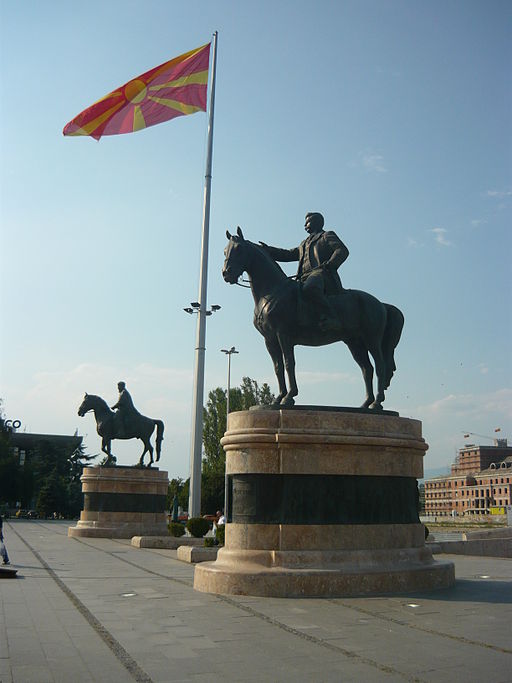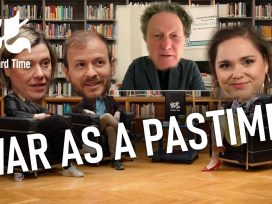Anti-liberalism and anti-globalism resonate with people who feel marginalized by globalization. Precarious life fuels populism worldwide. But the populist wave of the last decade is not merely spontaneous. In Bulgaria and North Macedonia, for example, populist narratives are disseminated in an entirely instrumental and intentional way. They stem not from the Kremlin, whose propaganda of course tries to reinforce them at the local level, but which is certainly not omnipresent. Rather, the actors spreading national populism are ‘homegrown’: a strange symbiosis of politicians and journalists who exploit disillusionment to advance their personal careers, and of local businesses whose existence depends on leeching off the state (the ‘oligarchs’).
Although populist language resonates with real social discontents, these actors do not promote social policies: on the contrary, their populism is a resource for eliminating rivals, for capturing institutions and, most importantly, for de-legitimating civic and institutional control over their activities. These local ‘hybrid networks’ have, to varying extents, been formed in all European countries.
Since the anti-monopoly and anti-oligarchy civic protests in Bulgaria in 2013, oligarchic networks have managed to increase the frequency of use of national-populist narratives by more than sixty times – from 850 online articles using a specific populist language in 2013 to more than 50,000 in 2018. Paradoxically, civic discontents seem to have motivated oligarchic networks to consolidate their power – a process that is continuing to the present day.
In neighbouring North Macedonia, however, the media are significantly freer of populist narratives. This is perhaps surprising, since until the anti-government protests in 2016 and the defeat of Nikola Gruevski’s VMRO-DPMNE in the elections that year, Macedonism – i.e. Macedonian radical national-populism – was effectively the official state ideology and the cover for a consolidated oligarchic form of government.
Of course, Macedonia’s pro-European course under Zoran Zaev’s SDSM government certainly helped clean up public language. The oligarchic network in North Macedonia has certainly not disappeared, however. Rather, it has calculated the benefits of EU and NATO membership and stepped back, at least rhetorically. After France, backed by Denmark and The Netherlands, blocked EU accession negotiations for North Macedonia in October 2019, leading to Zaev’s resignation in January 2020, populist narratives achieved partial breakthroughs. Particularly since the reopening of accession negotiations in March 2020, however, they are far from achieving hegemony.
Curiously, the most furious national-populist attacks were not directed at Macron and France. The hope for EU accession, which the oligarchic network also supported, was still strong: Macron, as a strong figure in the EU, did not therefore become a target. Instead, in the second half of 2019, resentment was directed at Bulgaria. If this were only a psychological matter it would be explicable: Bulgaria has been the main culprit for all ills ever since Titoist Macedonism. But this wasn’t just ‘projection’: the surge in anti-Bulgarian national-populism in North Macedonia was provoked mainly by Bulgarian national-populists.
Political parties
In the first half of 2019, there was political consensus between all parliamentary parties. The ruling SDSM, the previously incumbent VMRO-DPMNE, and the four ethnic Albanian parties that had been represented in parliament in various constellations in the last few decades (the Democratic Union for Integration/DUI; Besa Movement; Democratic Party of Albanians/DPA; and the Alliance for Albanians/AA) all unconditionally and unambiguously supported Macedonia’s accession to the EU and NATO. There were no significant differences in arguments in favour of accession and pragmatism prevailed across the board (‘anticipated investments’, ‘improved wellbeing’). Where there were differences, they were over the minorities issue, with ethnic Albanian politicians emphasising that the EU and NATO would act as guarantors of individual and minority rights and of inter-ethnic peace.
Significant discursive confrontation did however take place between SDSM and VMRO-DPMNE over the issue of the country’s name. Had it been absolutely essential to change it in order to be eligible for NATO and EU membership? According to the prime minister at the time, Zoran Zaev (SDSM), changing the country’s name – and signing the Prespa Agreement – had been a necessary compromise in order to achieve the coveted goal. Conversely, according to Hristijan Mickoski (leader of the VMRO-DPMNE), the name change had been an unnecessary sacrifice and an act of treason by the government. As such, it compared with the Treaty on Friendship, Good Neighbourliness and Cooperation with Bulgaria in 2017 and the Ohrid Framework Agreement or peace accord between the government of North Macedonia and ethnic Albanians in 2001.
This dispute is likely to fuel a more militant Macedonism in the future. So far, however, it has not been the West, NATO and the EU that have been held responsible but Greece and Bulgaria, and above all Zaev and his government, who failed to defend the Macedonian national interest. The pro-European consensus in politics, the media and among the public remains a pillar of public discourse, regardless of these disputes.
There are currently two marginal extra-parliamentary parties in North Macedonia that are pro-Russia and against the EU and NATO. Their names – Edinstvena Makedonija (United Macedonia) and Rodina (Motherland) – copy those of their Russian role models and their national-populist narratives coincide with all main elements of Russian propaganda. They are promoted by several completely anonymous online media outlets, which already attract thousands of followers on Facebook. It is in these areas that we can suspect direct meddling from Moscow. The Russian footprint, however, is still too small to be significant and will grow only in symbiosis with other factors.
Intellectual Macedonism
Compared to Bulgaria, propaganda in North Macedonia is at the nascent stage.While the media remain largely liberal and pro-European, figures have emerged who rework communist propaganda tropes and the clichés of global national populism.
While major newspapers and news websites rarely allow explicit Macedonism in editorials and reports, Macedonist voices regularly appear as columnists. National-populist voices are included alongside pro-European opinion in the name of pluralism and are thereby legitimated as ‘another point of view’. These intellectuals tend to be members of the cultural elite during socialism – poets, journalists, diplomats and the like. Having been partly marginalized, they are now establishing a profile as proponents of an anti-globalist restoration. Of course, there are younger figures among them. However, like in Bulgaria, the de-classing of socialist cultural elites is one of the main factors for the spread of disinformation and propaganda.
One of the most prominent among this group of intellectuals is the poet and critic Eftim Kletnikov. His style and thought is exemplified in an article on the ‘Macedonian Holocaust memorial centre’:
The Macedonians, with their cosmopolitan and utopian mentality of equality, justice and fraternity among peoples, have always been much more open to the outside, to the others, than to the inside, to themselves. This has brought us much misfortune, yet we still haven’t drawn a lesson from it. The ancient Macedonian kingdom of Alexander (divided after his death between the Ptolemies in Egypt and the Seleucids in Syria) stretched from Pella to the Himalayas in the east and the Egyptian pyramids in the south, only to be cut down to the small piece [of land] on which we tread today. But even though it is as small as a mustard seed, as Jesus would say, it is being snapped up by the wide-open jaws of the Greek, Albanian, and Bulgarian hyena … But this shouldn’t stop us, dear reader, from coming to our senses and asking ourselves, like John Donne and Hemingway, for whom the bell tolls. Because it tolls for us whom they are about to bury, if they haven’t already buried us with that Nazi-fascist North Macedonia … But these dark gravediggers don’t know about Macedonia’s historical talent for vampirism. The talent for rising from the deathly sleep in the identity grave that western liberal democrats fashioned for us.
This passage – typical of Kletnikov’s apocalyptic style – repeats the central theses of Titoist Macedonism: that Greater Macedonia, founded by Alexander the Great, was historically carved up and humiliated by all its neighbours except Serbia. The idea that Macedonia’s benevolent elder brother is Serbia and, by extension, Russia, is a geopolitical cliché of Macedonism.
Another prominent figure in intellectual Macedonism is Risto Nikovski, a former diplomat. In contrast to Kletnikov, Nikovski cultivates an image of sobriety and expertise, ‘critically’ analysing the international situation in terms of national interests and realpolitik. For example: ‘The confrontation between the USA and Russia made our admission to NATO urgent and helped Brussels. To solve these problems of theirs, Macedonia was forced to sign capitulation treaties with Bulgaria and Greece.’ Here, Nikovski is reproducing the pro-Serb Macedonism typical of the Yugoslav period, according to which the Bulgarians are the main enemy, closely followed by the Albanians and the Greeks.
Kletnikov and Nikovski, along with a dozen or so others with a similar profile, are regular columnists for the leftwing Nova Makedonija daily, the erstwhile organ of the Macedonian communist party, which at present is affiliated with the SDSM, despite having been critical of Zaev (the paper represents the conservative left establishment). However, the rightwing daily Večer, which is associated with VMRO and certain circles around former prime minister Nikola Gruevski, also features Macedonist contributors. They include the controversial Serbophile Dragan Pavlović Latas, a journalist of Serbian descent alleged of spying for Milosević during the Balkan wars. Other media outlets associated with Gruevski via advertising from Hungarian companies close to Viktor Orbán likewise publish nationalist-Eurosceptic material. Despite the political and ideological differences between Nova Makedonija and Večer, some national-populist voices – including Nikovski and the writer and journalist Aleksandar Rusjakov – are published in both.

Monument to Macedonian revolutionaries Gotse Delchev and Dame Gruev in Skopje. Photo by Dvacet from Wikimedia Commons
National populist narratives
When evaluating the extent of national populism in a national public sphere, the first question is which narratives are borrowed from the international repertoire of populism, in particular from Russian media, and which are local innovations. In a next stage, it is necessary to look at distinct vocabulary and keywords and to ask how these lend themselves to mass dissemination and transition between narratives. How do elements of an individual’s language enter the speech of a particular group and then become part of the national vocabulary?
In terms of national-populist propaganda, the Macedonian online environment is relatively ‘uninteresting’. Narratives rehash, with minor local variations, the clichés of global national populism: anti-liberalism, anti-globalism, sovereignism, and so on. Individual keywords are only just beginning to appear and the vocabulary of populist narratives remains confined to smaller groups. The dissemination of populist narratives – measured in terms of frequency of use of the identified keywords – is limited, at least in comparison with Serbia and Bulgaria.
Contemporary populist discourses, and Russian media propaganda in particular, mix leftist critiques of western capitalism, neoliberalism and corporate imperialism with conservative critiques of globalization and its excessive ethical individualism and loss of traditional values. All of this is also present on the Macedonian scene, however in a relatively ‘soft’ form. Populist critique of the West usually does not directly attack NATO and the EU, so strong is the political and public consensus in favour of accession to both. Predicates such as ‘fascist’, ‘liberal-capitalist’ and ‘postmodernist’ are attached less often to particular institutions than to the West or Europe in general. Still, between 1 February 2019 and 24 January 2020, SENSIKA found just 977 Macedonian-language articles containing elements from this semantic cluster. By comparison, there were 4,244 articles in the Bulgarian language.
It is telling that, in North Macedonia, the conspiracy theory claiming that George Soros is a conduit of western colonialism has so far failed to gain traction. While the term ‘Sorosoid’ does exist as a pejorative description of pro-western elites, it appeared in only fifty-three articles last year, while in Bulgaria it is used almost a thousand times a year. Vilifying the EU and its representatives is even less popular. When, in October 2019, France blocked EU accession negotiations with North Macedonia (and Albania), disappointment was expressed without resorting to offensive language. Even a vehemently anti-western figure like Eftim Kletnikov used the occasion to say that Emmanuel Macron was not to blame but North Macedonia’s own corrupt politicians.
Pro-western consensus, especially on sensitive issues that may affect North Macedonia’s chances of joining NATO and the EU, becomes near total in critical situations. This is partly because the country’s small public sphere is easier to govern – consensus is maintained with a strong arm by the political elite and media owners. However, national-populist narratives do occasionally occur in discourse about the country’s EU neighbours Greece and Bulgaria. Here, the government are accused of being ‘quislings’ (kvislinzi), ‘a-national renegades’ (anacionalni odrodnici), ‘political Lilliputians’ (politički liliputanci) and so on.
This repertoire of epithets is often identical in all the Slavic languages. Most often, terms and phrases are directly calqued from Russian propaganda. In Russia, the logic of populist propaganda underlying such language is institutionalized: most media outlets are controlled by the Kremlin and all foreign-funded NGOs are defined by law as ‘foreign agents’. In Bulgaria the logic of populist propaganda is not codified, but it has long been a widespread means for media repression.
However, North Macedonia is far removed from both the Kremlin’s institutionalized populist authoritarianism as well as the ‘free’ and ‘commercial’ propaganda in Bulgaria. Insofar as there are established, consistently used propaganda epithets, their use is thematically limited, mostly in connection to the Prespa Agreement with Greece, and the Treaty on Friendship, Good Neighbourliness and Cooperation with Bulgaria. The ironic terms Severdžanistan (literally the ‘North Country’) and severdžan (‘northerner’) have entered the national-populist idiolect – a linguistic innovation of sorts.
Neighbourhood quarrels
The encroachment on national identity supposedly represented by the two agreements has therefore led to an increase not of anti-westernism but – for the time being – of anti-Greek and anti-Bulgarian rhetoric (the third classical enemy of Yugoslav Macedonism, ‘Greater Albania’, has been almost forgotten). In the year under review, the frequency of use of anti-Greek rhetoric began to decline (after peaking in 2018 with the signing of the Prespa Agreement in June), while anti-Bulgarian rhetoric increased: Bulgarians are called ‘fascists’ in 366 articles, with the frequency increasing steadily over the year.
The latter development had a cause: a political dispute over the identity of Gotse Delchev, a revolutionary hero in the official historiographies of both Bulgaria and North Macedonia. Ironically enough, the dispute originated in the joint commission of historians set up under the bilateral friendship treaty, assigned the task of aligning the schoolbooks of the two countries. In June 2019, two Bulgarian politicians from the national-populist VMRO – a junior coalition partner in the government – demanded that Macedonia recognize the Bulgarian interpretation of the two countries’ common history until 1944.
Bulgaria was the first country to recognize Macedonia’s independence as early as January 1992; later, it supported Macedonia’s accession to NATO and the EU. However, the Bulgarian VMRO managed to break this decades-long policy in June 2019 when it made North Macedonia’s accession to the EU dependent on the resolution of all historical disputes with Bulgaria.
This led to an increase in anti-Bulgarian sentiment in the North Macedonian media. For a while, it seemed that anti-Bulgarian and Macedonist rhetoric would become the official policy of some outlets. For example, on 6 August the front page of the daily Nova Makedonija featured a public statement by the association ‘Macedonian Manifesto’, authored by Eftim Kletnikov, Aleksandar Rusjakov, and others. However, both Nova Makedonija and the other more influential media outlets gradually reverted to the time-tested tactic: neutral editorials, but with more anti-Bulgarian comments and reports, for example, about how the Bulgarian military authorities sent Jews from the Macedonian territories to Nazi death camps during the Second World War.
What was ostensibly a dispute about history served as an occasion for both countries to begin speaking in one and the same language: global populism. The master of populist language is Russia, whose propaganda alternately congratulates Bulgaria and North Macedonia – even through Vladimir Putin personally – for having done one and the same historic job in a ‘sovereign’ way.
This case shows that, in North Macedonia, the fuse of national populism still tends to be lit over local issues, and not without external provocations. For the time being, however, it quickly subsides and fails to dent the pro-European consensus. In the foreseeable future, Macedonism will remain a loaded gun. If the country loses the prospect of joining the EU, it may go off. However, as the Bulgarian comparison shows, EU accession is no guarantee that the threat will remain dormant. On the contrary: the local oligarchic network, knowing that it has access to the benefits of EU membership, could use national populism as a means for wrecking civic and institutional democratic control.








